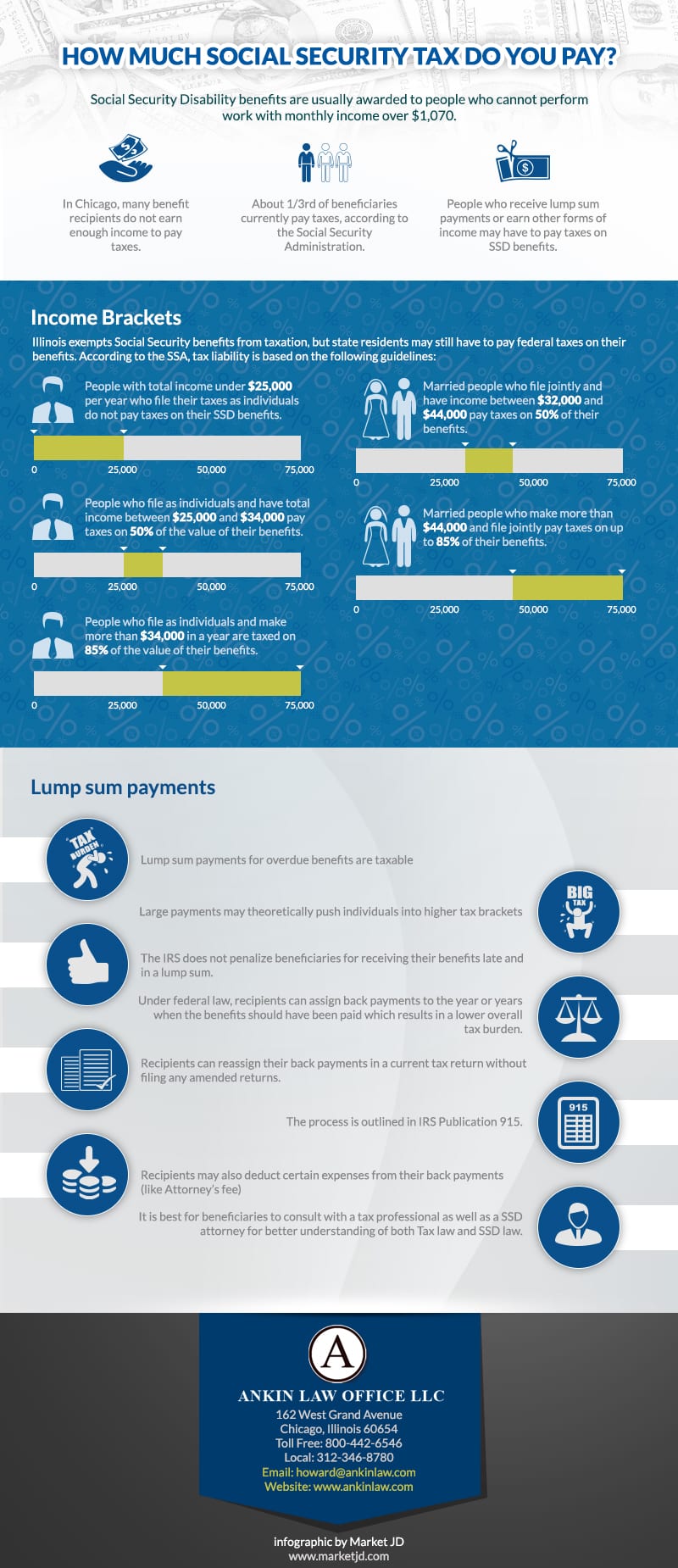People who are new recipients of social security benefits may need to ask – does Illinois tax Social Security? A Chicago Social Security benefits attorney can help social security recipients understand their rights and obligations.
Table of Contents

Social Security Benefits
Social Security Disability benefits are usually awarded to people cannot perform work with monthly income over $1,070. Applying for and qualifying for disability benefits can be complicated. However, once a person has completed the application and has begun receiving benefits, he or she may want to know – are Social Security benefits taxable?
Many benefit recipients in Chicago do not earn enough income to pay taxes. However, about one-third of beneficiaries have a high enough income to pay Federal taxes, according to the Social Security Administration. Further, people who receive lump sum payments or earn other forms of income may have to pay taxes on SSD benefits.
(article continues below infographic)

Is Social Security Taxed in Illinois?
Illinois exempts Social Security benefits from taxation, but state residents may still have to pay federal taxes on their benefits. According to the SSA, tax liability is based on the following guidelines:
- People with total income under $25,000 per year who file their taxes as individuals do not pay taxes on their SSD benefits.
- People who file as individuals and have total income between $25,000 and $34,000 pay taxes on 50% of the value of their benefits.
- People who file as individuals and make more than $34,000 in a year are taxed on 85% of the value of their benefits.
- Married people who file jointly and have income between $32,000 and $44,000 pay taxes on 50% of their benefits.
- Married people who make more than $44,000 and file jointly pay taxes on up to 85% of their benefits.
SSD benefits are often taxed at a marginal rate of 10-15%. However, individuals with higher annual income might see 85% of their benefits taxed at the same rate as the rest of their income.
Lump Sum Payments
Lump sum payments for overdue benefits are taxable, and large payments may theoretically push individuals into higher tax brackets. However, the IRS does not penalize beneficiaries for receiving their benefits late and in a lump sum. Under federal law, recipients can assign back payments to the year or years when the benefits should have been paid. This may result in a lower overall tax burden.
Recipients can reassign their back payments in a current tax return without filing any amended returns. The process is outlined in IRS Publication 915. Recipients may also deduct certain expenses from their back payments. For example, recipients who work with an SSD attorney typically pay a set proportion of back payments as an attorney’s fee. This fee can be discounted from personal income as an itemized miscellaneous deduction.
For most beneficiaries, determining whether benefits are taxable can be challenging, given the complexity of both SSD law and tax law. It is usually best for beneficiaries to consult with a tax professional as well as an SSD attorney to ensure they understand their obligations.
Does Illinois Tax Social Security?

When social security benefit recipients ask the question “do you pay taxes on social security?” there is no simple answer. Realistically, Social Security benefits are taxed based on each individual’s circumstances and income tax bracket. A Social Security disability lawyer can help Social Security recipients understand whether they need to pay taxes and how much they need to pay. They can also help people apply for benefits or appeal a denial of benefits.



